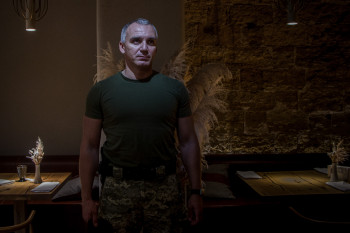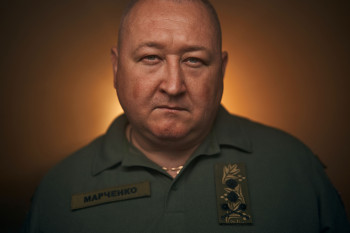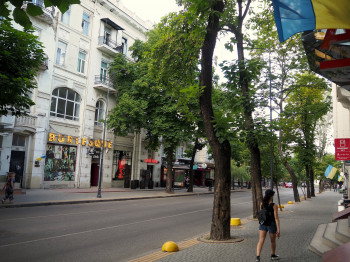In constantly shelled Mykolaiv, volunteers do not back down

Located a mere 30 kilometers from the war’s southern front lines, Ukraine’s shipbuilding capital Mykolaiv has been a constant target for the Russian military throughout its full-scale invasion.
Shelled almost daily, the regional capital with a pre-war population of 480,000 has seen over 500 residential buildings destroyed and more than 130 civilians killed by Russian attacks, according to Mykolaiv Mayor Oleksandr Sienkevych. More than 600 civilians have been injured.
While many residents have left the city for safer parts of Ukraine or abroad, half have stayed.
Those who are still in Mykolaiv are facing a water crisis. After a month of a complete shutoff, the water that comes out of the tap is unsafe to drink.
Now, thousands of volunteers, mostly from Mykolaiv and nearby Odesa, are providing the needed support to those who have decided to stay.
The Kyiv Independent spoke with volunteers in Mykolaiv Oblast about their work. Many of them either left or lost their jobs after Feb. 24 and decided to dedicate their time and effort to saving others.
The Mykolaiv Help fund
Karyna Kuzmenko, a volunteer of the Mykolaiv Help fund, stands in front of a group of elderly people as she distributes water and cookies.
Before Russia’s full-scale invasion, Kuzmenko worked as a content manager but decided to leave that job to become a volunteer, “given the urgency of the matter,” she said.
“We started by helping soldiers, but thanks to our Canadian partners, we managed to organize our first distribution of food and water to civilians,” she told the Kyiv Independent.
Kuzmenko said the fund distributes 13-kilogram packages to residents that include things like porridge, pasta, canned meat, and vegetables. Many of the residents come to the fund because they’ve lost their jobs as a result of the war, according to Kuzmenko.
Maksym Savytskyi, the fund’s founder, said he and three other friends launched the Mykolaiv Help Fund in memory of his father, who had been serving in Ukraine’s military since 2014 and was killed in the early days of the invasion.
According to Savytskyi, the city and the oblast refused to help the fund, and until June, its main source of support came from donations and from people Savitskyi and others knew personally. He said the fund will likely turn to grants to continue operating.
“Despite the danger in the city, I am not planning on leaving Mykolaiv, and I will continue providing help to residents,” Savytskyi said.
The Ukrainian Red Cross Society (URCS)
At the end of July, dozens of Ukrainian Red Cross volunteers gathered at a cemetery to say their last goodbyes to their fellow volunteer, Valentyn Latynsev. He was killed along with his parents by a Russian cruise missile on June 29.
Over 800 volunteers have joined the URCS in Mykolaiv Oblast since Russia’s full-scale invasion began.
Serhiy, 46, stood next to the entrance of the cemetery. He told the Kyiv Independent he met Latynsev at the volunteer center, and they later became friends.
Latynsev was responsible for the center’s pharmacy, which distributed free medicine to people in need. “He took care of every single patient,” Serhiy said of him.
Just two days before the funeral, more than 50 Ukrainian prisoners of war were reportedly killed in what is believed to be a Russian attack on a prisoner camp in the Russian-occupied town of Olenivka in Ukraine’s Donbas. Many of the soldiers were from the Azovstal metal plant in Mariupol, who surrendered after a months-long siege of the city by Russia.
The International Red Cross, along with the UN, were supposed to be the guarantors of the POW’s safety.
When asked about the attack on the Olenivka camp, Serhiy reaffirmed the organization’s necessity to keep a neutral stance.
“Absolute neutrality is crucial. Even if an unarmed Russian soldier came to our center, we would help him. But Russia needs to cease its attacks. Every day they hit us with missiles. We know that Russia is clearly responsible, and the people who killed our colleague should be put on trial” he said.
Another volunteer and good friend of Latynsev, Krystyna Kardash, was also at the funeral. She has been helping the war effort since Russia started its war of aggression against Ukraine in 2014 but started working with the UCRS when Russia’s full-scale invasion began in February.
Despite the fact that she has previously worked abroad, she says she has no plans to leave Ukraine at the moment as her husband is currently serving in the military.
“If Russia invades Mykolaiv, I will not leave. I will join the army and defend my city,” she said.
Volunteers from Odesa
Residents in Mykolaiv agree that the main problem the city is facing is access to clean water.
Even though there has been running water since May after nearly a month of complete interruption, locals complain of the water having an orange color and salty taste.
Water access points are located everywhere around the city to ensure that people can get free and clean water. Often, this water is transported in trucks that come from Odesa, Ukraine’s bustling port city located about 130 kilometers from Mykolaiv.
Artem Kozaruk, 28, a well-known volunteer from Odesa with a substantial Instagram following, started an initiative to bring water from his hometown to Mykolaiv. Together with four other friends, he has delivered almost 1000 liters of clean water to the southern city.
He said they started helping Mykolaiv when it was completely cut off from water supplies on April 12. They initially brought a ton of water per day, but quickly realizing it wasn’t enough, began to deliver at least 70 tons each week. On one particular day, they delivered an extra 150 tons.
According to Kozaruk, Mykolaiv city officials claim there is water in the city, and have refused to provide any assistance to his organization in trying to get residents water. He also lamented the fact that the media does not write more about the water issue in Mykolaiv, “even though it is very real.”
“You can only use this (Mykolaiv) water to clean a toilet,” he said.
But despite the difficulties in providing residents with clean water and assisting those who have stayed behind, Kozaruk is confident he and his fellow Ukrainians will continue helping as long as needed.
“We will keep going until every problem is solved. Ukraine will win, we are confident, and we believe in our Armed Forces. Everything will be alright.”















